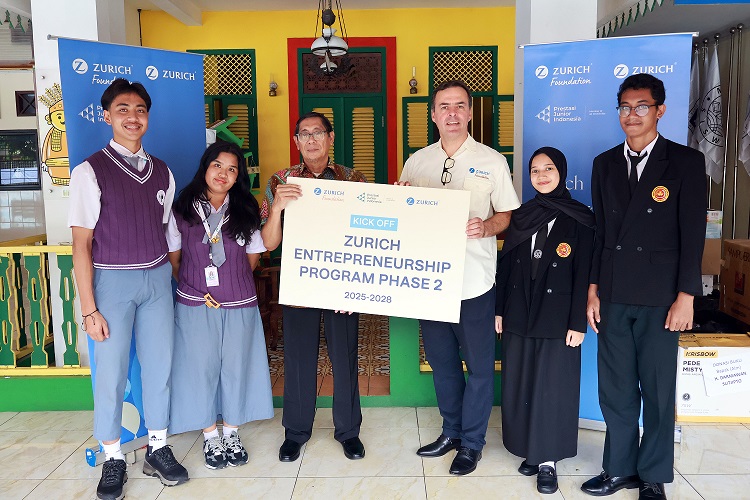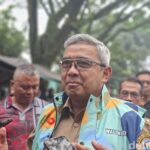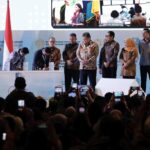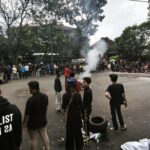Zurich Indonesia, together with Z Zurich Foundation and Prestasi Junior Indonesia (PJI), launched the second phase of the Zurich Entrepreneurship Program (ZEP) with a broader scope.
This educational program on entrepreneurship, financial literacy, and career readiness aims to reach 16,900 students from 105 high schools and vocational schools in seven cities and regencies: Jakarta, Bandung, Surabaya, Sidoarjo, Semarang, Yogyakarta, and Denpasar.
The program, which will run until 2028, is designed so that students not only understand business concepts but also put them into practice by establishing micro-enterprises at school.
Participants will receive training to build an entrepreneurial mindset, develop business plans, manage finances, and sharpen leadership and teamwork skills.
The importance of financial literacy and entrepreneurship for the younger generation was emphasized.
“Through the second phase, we want to build business capabilities as well as students’ self-confidence and independence. We are proud to create a broader positive impact for schools, teachers, and students in Indonesia,” it was stated.
Teachers are also involved as key drivers through special training so they can integrate entrepreneurship modules into classroom learning.
This approach is expected to strengthen the capacity of educators and ensure the program’s sustainability in schools.
Young people have great potential that needs to be facilitated through access to training and equal opportunities.
“Through the second phase, we want to open more doors so students can learn, try, and dare to create opportunities,” it was noted.
In addition to teachers, Zurich Indonesia volunteers are also directly involved as mentors to share professional experiences. This involvement gives students a realistic picture of the working world and enriches their learning process.
Jakarta
Jakarta is the capital and largest city of Indonesia, founded in the 4th century as the Hindu port of Sunda Kelapa. It was later conquered and renamed “Batavia” by the Dutch East India Company, serving as the center of the colonial Dutch East Indies for over three centuries before becoming the modern capital after Indonesia’s independence.
Bandung
Bandung is the capital of West Java, Indonesia, famously known as the “Paris of Java” for its European-style architecture and vibrant arts scene. Historically, it gained prominence as a major plantation town under Dutch colonial rule and was the host of the 1955 Asia-Africa Conference, a pivotal event in the Cold War. Today, it is a bustling, modern city renowned for its university culture, creative industries, and surrounding volcanic highlands.
Surabaya
Surabaya is Indonesia’s second-largest city, located on East Java, and is historically significant as a major port and trading hub. It is famously known as the “City of Heroes” for its pivotal role in the nation’s struggle for independence, particularly during the fierce Battle of Surabaya against Allied forces in 1945. Today, it remains a vital economic center and a modern metropolis with numerous monuments commemorating its history.
Sidoarjo
Sidoarjo is a regency in East Java, Indonesia, historically known as an important port and trade center during the Majapahit Kingdom. It is now most widely recognized for the devastating Lusi mud flow, a volcanic mud eruption that began in 2006 and submerged numerous villages, creating a major environmental and social disaster.
Semarang
Semarang is a historic port city on the north coast of Java, Indonesia, which grew as a major trading hub during the Dutch colonial era. Its history is reflected in its old town (Kota Lama), a well-preserved area featuring European-style buildings from the 18th century. The city is also a cultural melting pot, known for its distinctive blend of Javanese, Chinese, Arab, and Dutch influences.
Yogyakarta
Yogyakarta is a historic city on the Indonesian island of Java, serving as a major center for classical Javanese culture and arts. It was the seat of the powerful Mataram Sultanate in the 16th century and remains a special region ruled by a monarchy today. The city is a gateway to the magnificent 9th-century Hindu temple complex, Prambanan, and the world’s largest Buddhist temple, Borobudur.
Denpasar
Denpasar is the capital and largest city of Bali, Indonesia, historically serving as the seat of the Badung kingdom. While it is now a bustling modern hub, its cultural history is preserved in sites like the Pura Jagatnatha temple, dedicated to the supreme god Sang Hyang Widi Wasa.






